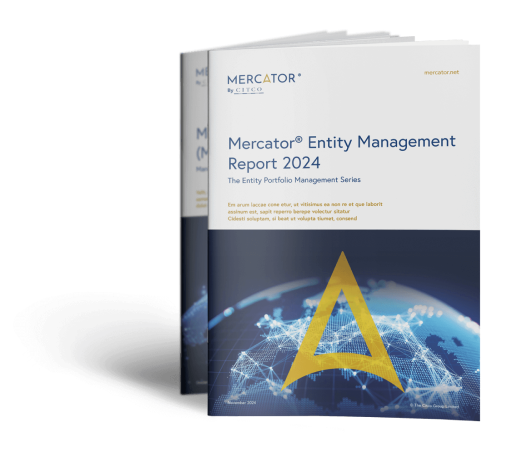The information contained in this document is marketing material and for informational purposes only. The information contained in this document is presented without any warranty or representation as to its accuracy or completeness and all implied representations or warranties of any kind are hereby disclaimed. Recipients of this document, whether clients or otherwise, should not act or refrain from acting on the basis of any information included in this document without seeking appropriate professional advice. The provision of the information contained in this document does not establish any express or implied duty or obligation between Citco and any recipient and neither Citco nor any of its shareholders, members, directors, principals or personnel shall be responsible or liable for results arising from the use or reliance of the information contained in this document including, without limitation, any loss (whether direct, indirect, in contract, tort or otherwise) arising from any decision made or action taken by any party in reliance upon the information contained in this document. © The Citco Group Limited, December 2024.
Navigating Entity Management in Indonesia
Indonesia’s rapidly growing economy, strategic location in Southeast Asia and large consumer market makes it an attractive and dynamic destination for foreign investors.
However, new data from the Mercator Entity Management 2024 Report, reveals Indonesia as the most challenging jurisdiction for entity management globally – based on the cost and time required to complete tasks.
Multinationals operating in Indonesia must contend with complex bureaucracy and multi-layered approvals. Companies are also required to navigate various government departments, often facing manual process and varying levels of digital infrastructure.
Navigating the country’s complex corporate governance framework poses significant hurdles for multinational companies. Whilst Indonesia offers a wealth of opportunity for international businesses, success in this dynamic market demands careful planning, continuous assessment, and local expertise to effectively manage these intricate regulatory and administrative challenges.
Digitalization Drive
In recent years, Indonesia has implemented several initiatives to streamline entity management through digital means. The Online Single Submission (OSS) system was launched in 2018, with the aim of simplifying the business registration and licensing process and enabling better coordination between businesses and various government authorities.
While it has improved efficiency and reduced some administrative obstacles, the system still presents challenges. Implementation has been uneven across different regions, and some users report technical glitches and interface issues. Integration with local government systems remains incomplete in some areas, leading to occasional inconsistencies. Additionally, the system’s effectiveness is sometimes hampered by the need for physical document submissions, requiring manual and in-person processes.
Although e-signatures are legally recognized, certain documents still require traditional ‘wet-ink’ signatures or specific forms of electronic signatures. Additionally, the implementation and acceptance of e-signatures can vary across different sectors and government agencies.
Regulatory Developments ‘The Omnibus Law’
Indonesia’s Omnibus Law, officially known as the Job Creation Law (Law No. 11 of 2020), is a comprehensive reform package aimed at improving the country’s investment climate and ease of doing business. Enacted in November 2020, it impacts entity management for multinational companies operating in Indonesia in several significant ways including easing of foreign ownership restrictions in many sectors, revisions to labor regulations, and simplifying land acquisition for strategic projects.
While the law seeks to make business operations more efficient, businesses still face ongoing uncertainties around the application and interpretation of the new rules. It is also worth noting that the law has faced some legal challenges and public opposition, particularly regarding labor and environmental provisions, which may lead to further adjustments in the future. Multinational companies need to closely monitor these developments and may need to adjust their entity management strategies accordingly.
Risk of Non-Compliance
Non-compliance with key corporate governance requirements in Indonesia poses significant risks for companies. Failure to submit annual reports can result in fines, administrative sanctions, and potential revocation of business licenses. Neglecting to maintain up-to-date licenses and permits may lead to operational disruptions, financial penalties, and legal action against the company and its directors. For foreign companies, persistent non-compliance could lead to difficulties in obtaining future permits or even forced divestment.
Inadequate disclosure of ultimate beneficial ownership (UBO) information is particularly serious. Non-compliance can result in administrative sanctions, fines, and in severe cases, suspension or revocation of business licenses. It may also trigger investigations for potential money laundering or tax evasion. As Indonesia continues to strengthen its anti-money laundering and counter-terrorism financing frameworks, the enforcement of UBO disclosure requirements is likely to become more stringent.
Key considerations for Entity Management in Indonesia
1. Be prepared for a complex regulatory landscape
Indonesia’s entity management regulations, blend civil, Islamic, and customary laws. Foreign businesses face evolving ownership restrictions and capital requirements. Industry-specific rules and local authority involvement add complexity, often causing delays and increased costs.
2. Ensure you have the correct licenses and permits
Obtaining necessary permits, including the Business Identification Number (NIB) and operational licenses, is crucial but time-consuming. Ongoing compliance is essential to avoid fines, penalties, or operational suspension.
3. Keep pace with legal developments
The legal landscape of Indonesia is subject to frequent changes, which can pose difficulties for companies in maintaining compliance. In addition to the Omnibus Law, tax regulations and labor laws are frequently revised. Companies must stay updated and adjust strategies to maintain compliance, often necessitating local support.
4. Adhere to all filing dates
Indonesia complex tax system demands strict adherence. Companies are required to comply with local tax authorities’ e-filing systems and adhere to monthly, quarterly and annual reporting deadlines, or face possible negative consequences.
Ruta Jastremskiene
Senior Legal Officer, Mercator by Citco, Citco Mercator, UAB

